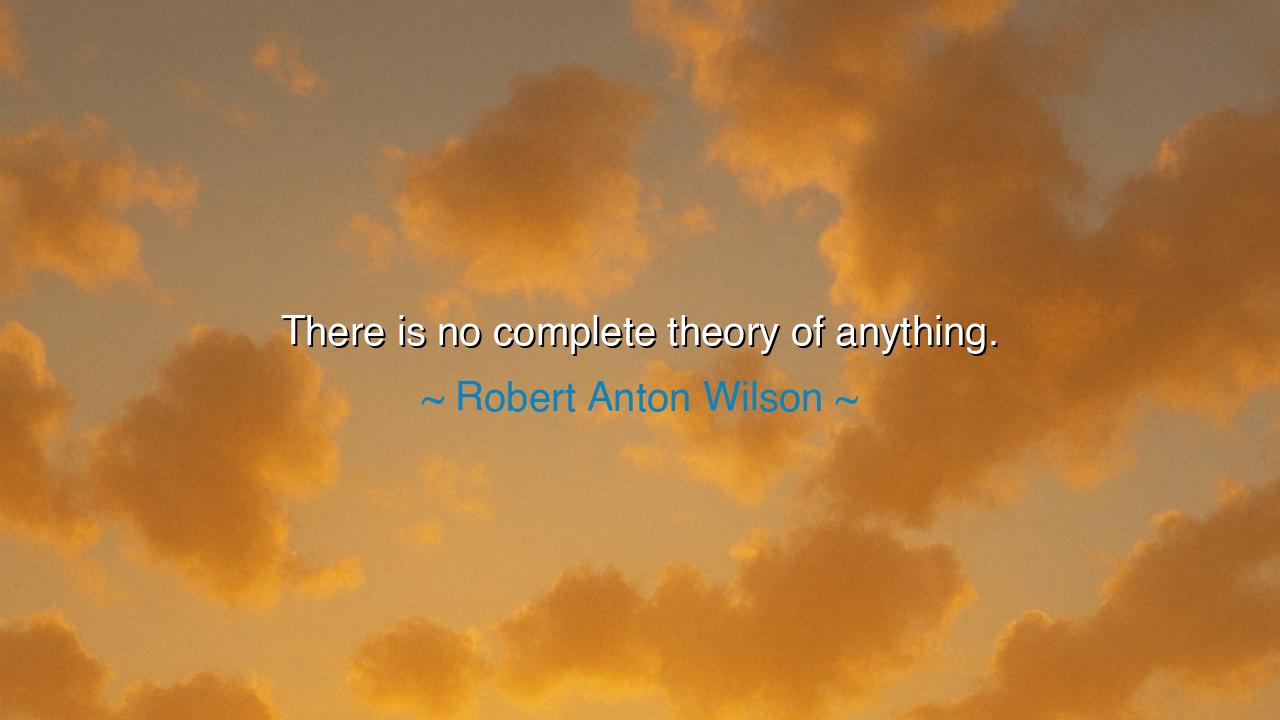
There is no complete theory of anything.






"There is no complete theory of anything." These words by Robert Anton Wilson resonate deeply with the essence of human curiosity and the pursuit of knowledge. At their core, they remind us that the search for truth, whether in science, philosophy, or the very fabric of life, is an eternal journey—one that can never be fully concluded. Wilson’s insight challenges the notion of a final or complete understanding, emphasizing that our theories—whether they concern the universe, human nature, or the forces that govern life—are but temporary constructs. These constructs are bound by the limits of our perception, our time, and our current level of understanding. As we delve deeper into the mysteries of existence, we find that each discovery raises more questions than answers, and that what we believe to be complete today is merely a stepping stone in the continuous expansion of human insight.
In the ancient world, the pursuit of knowledge was often intertwined with a belief in the limitless nature of the cosmos. Plato spoke of the eternal search for the Forms, the idealized truths beyond the material world. Yet, even Plato knew that the truth was ever elusive—a form of knowledge that could only be approached, never fully attained. Socrates, too, demonstrated this through his method of questioning, recognizing that the more we learn, the more we realize the depth of our ignorance. In their dialogues, the Greeks did not seek to create final theories but to explore the questions that would continue to shape their world. In this way, they were the first to recognize that knowledge is an ongoing process, a journey rather than a destination. Wilson echoes this ancient wisdom when he reminds us that there is no final answer, no complete theory, for the quest for understanding is a living, breathing thing.
One of the clearest examples of incomplete knowledge can be found in the history of science. Take, for instance, the work of Isaac Newton. When Newton formulated his laws of motion and universal gravitation, they were revolutionary in their simplicity and power. For centuries, these laws were seen as the final word on the workings of the universe. But, as we delved deeper into the nature of reality, we discovered that Newton’s laws were not the complete truth. The theory of relativity developed by Einstein showed that gravity was not a force acting at a distance, as Newton had believed, but the effect of mass bending space-time. And even Einstein’s theories were found to be incomplete with the advent of quantum mechanics. Today, scientists know that both general relativity and quantum mechanics are necessary to explain the universe—but neither can fully explain it on their own. What this reveals is that theories, however groundbreaking they may be, are limited in scope, and the quest for truth will never end. Theories evolve, expand, and give way to new inquiries.
Wilson’s declaration challenges us to consider that certainty is a myth. Complete understanding is not an attainable goal but a direction in which we move, ever searching, ever learning. Leonardo da Vinci, the great polymath, understood this well. His curiosity knew no bounds. His investigations into anatomy, flight, and engineering were based on the firm belief that knowledge must be approached from many angles, and that no single theory could ever encapsulate the complexity of life. The world he observed, much like the world today, was filled with mysteries that demanded constant questioning and exploration. Even in his time, the greatest minds were aware that a single, complete theory would never be enough to explain all the phenomena of nature.
The lesson in Wilson’s words is that we must embrace the incompleteness of our knowledge. Just as Socrates declared, "I know that I am intelligent, because I know that I know nothing," so must we approach life with a sense of humility—recognizing that our understanding is always in flux, always evolving. The most brilliant discoveries may lead to new questions, and the answers we discover today may soon give way to newer, deeper understandings. The wisdom lies not in the certainty of what we know, but in the open-mindedness to question further, to seek deeper, and to recognize the beauty in the journey of discovery rather than the destination. Science, like philosophy, is an eternal search, one that should be pursued with curiosity, humility, and patience.
In your own life, reflect on how you approach knowledge. Do you treat your beliefs and ideas as final truths, or are you open to the evolving nature of understanding? Like Wilson, strive to approach life with the awareness that there are no complete theories. Every answer you arrive at will likely lead to new questions—this is the beauty of life and learning. Knowledge, whether in science, art, or personal growth, is never truly final; it is a living, changing thing, and we are its willing explorers. Embrace the incompleteness of your journey, knowing that each discovery is but a step toward something greater and more wondrous than you can yet imagine. Seek not just to accumulate facts, but to enjoy the endless wonder of learning, where each new question leads to a new horizon to explore.
Thus, let Wilson’s wisdom guide you as you walk your path. Recognize that the search for truth is not a race to a finish line, but an unfolding journey, where each piece of knowledge gained reveals the depth of what remains to be discovered. Embrace the imperfection of your understanding, for it is through this very imperfection that you will continue to grow, to learn, and to discover the wonders of the world.






AAdministratorAdministrator
Welcome, honored guests. Please leave a comment, we will respond soon